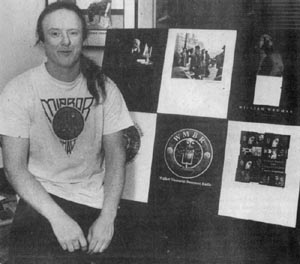THE CAMBRIDGE EDGE
Thursday, February 4, 1993
Fitting business and activism to a tee
T-shirt printer speaks out on neighbor CASPAR, and scial activism
|
Special to the Chronicle The east end of Albany Street - a quiet corridor of brick buildings with little traffic and fewer pedestrians - is a lonely place. At the far end, secluded from Mass. Ave., is the CASPER homeless shelter, which is currently trying to find a new home in Cambridge. Across the street is the only small business around: Mirror Image Inc., a T-shirt printing shop headed by Richard Roth, who recently spoke favorably of his controversial neighbor at a public meeting to debate locating the shelter in Central Square. Roth says he was shouted down by a Central Square businessman whose opinion of the homeless was less than favorable. Roth, a boyish-faced man with a pony tail and baseball cap, related the story without anger or resentment, but with a sad, gentle shake of his head. If CASPAR (Cambridge and Somerville Program for Alcoholism and Drug Abuse Rehabilitation) ever needed a good neighber, they find one in Roth, as much a social activist as a businessman. "We've been here for five years," says Roth, "and we're here late at nights. I think it's good the shelter's there. A few week ago some old guy fell down in front of the building, and they just came over and handled it in a real professional way, I thought." During his time on Albany Street, Roth says he has suffered much less vandalism and crime than he expected. Perhaps because police ofter bring guests to the shelter, increasing law enforcement visibility in the area. According to Roth, homelessness is part of any city environment, something to be expected as a condition, while not necessarily tolerated as a problem. "This worrying about people peeing on the lawns," Roth remarks, "that's why you have shelters, so people will have someplace to go. I don't see that as an annoyance, I see that as a sad state of affairs." As regards the future of CASPAR, Roth said he hoped above all that the shelter, wherever it is relocated, continues to be run well, preferably with a day program. Roth's concern for other people literally paves the walls of Mirror Image. There are T-shirts for Amnesty International (to which Roth, an 11-year member, estimates he donates 30 hours a week), ecological groups, and unions. Mirror Image comprises two businesses; a T-shirt shop that prints to order; and Ken Brown Designs, T-shirts depicting the art of former Cambridge resident Ken Brown, first and perhaps best known for his postcards "Ike and Tina" (Tine Turner and Eisenhower) and "Whistler's Brother Ernie from Duluth." Brown's shirts, once printed in Roth's basement, are now shipped worldwide. When Roth counts off Mirror Image's specialties, he calls attention to their work in full-color processign, four-screen black-and-white printing, and finally, "a lot of left-wing political stuff," a slant Roth says he shares with his 11 employees. With Roth's political leanings and concerns, has he ever turned down business? |
 "We turned one down this week, actually," says Roth, a Boston University fraternity that wanted to print a T-shirt design depicting a woman positioned for oral sex on a man. "I don't really censor things," says Roth. "but it was offensive to women, and the women that worked here didn't want to print it." Other accounts Roth has turned down are an ROTC contingent ("Their design was really violent") and a "Just Say No to Drugs" T-shirt ("I just felt it was simple-minded and stupid, and I didn't want to do it"). Obviously, then, social concerns and day-to-day business are, for Roth, not separate things to be balanced, but two pursuits that interact. "I use my business skills to Amnesty's benefit," says Roth, "If someone comes in and I think their art's great, I ask, 'Would you consider doing something for Amnesty in the future?' and I don't hit anybody up too often. "Right now Cliff Selbert Designs-a company in Cambridge-they're donating art for a T-shirt for Amnesty for a logo for a conference that's going to be held here this summer. And then we'll print it inexpensively and amnesty can sell them and make money." Roth calls attention to his Amnesty group's work for Guatemalan youth Jose Sotz, who at three years of age was paralyzed by a sniper's bullet, intended for his father, a trade unionist. In the late 1970s, Amnesty brought Jose and his father to America, and now Jose attends school in Cambridge. Roth points out that his small group of Amnesty volunteers raised $10,000 for the Sotz family, money that went in part toward a wheelchair for Jose. Now if a five-year-old business can help raise that amount of money says Roth, perhaps long-standing businesses in Central Square can do great things to help the homeless. "We all have to work together," says Roth. "You don't lash out at people who are struggling." A final note on the frat from BU, evidence that Roth's sensitivity and social concerns may be contagious: After hearing Roth's reasons for not printing the sexually offensive shirt, the frat boys apologized to Roth, and promised they would draw a new design. |
All material designed and copyrighted by
Questions or problems to report about this web site? Contact the Webmaster at webmaster@mirrorimage.com